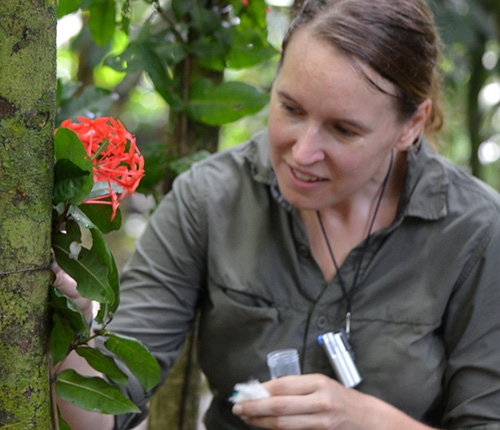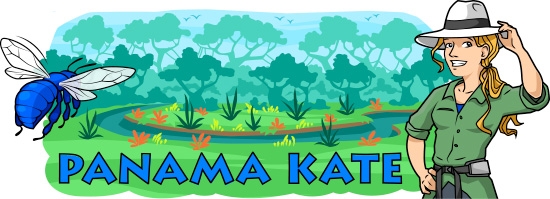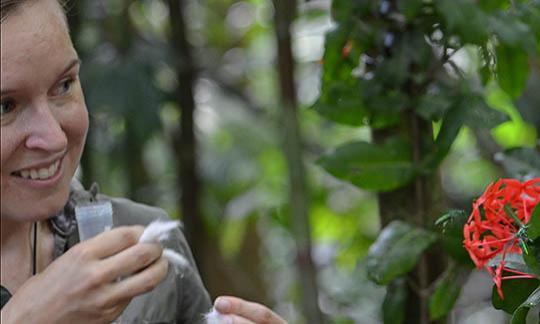show/hide words to know
Genetics: the field of biology that studies how genes control the appearance of living things and how genes are passed down from parent to offspring... more
Jacques Cousteau: a famous explorer and researcher of life in water (born June 11, 1910 – died June 25, 1997. He was also an inventor and filmmaker who made many popular film and television documentaries... more
Parasite: an organism that lives on or inside another organism (the host) and uses it to survive, causing damage or harm to the host.
Career Path for Kate Ihle
Fast Facts:
- Number of years in school: 22
- Favorite class / subject: Literature
- Hardest class / subject: Chemistry
- First Job: Lifeguard
- Dream job as a kid: Oceanographer
- One word you would use to describe your current job: Exotic
From Minnesota to Panama - the road of a field biologist
As a child, Kate Ihle was a “towny,” a kid who lived in Thief River Falls, a small agricultural community in Minnesota. She had friends on the swim team, was a lifeguard during the summer, and hiked in the woods and swamps nearby. Did she know that being a scientist was in her future? Not exactly.
“I was always collecting crayfish, frogs, turtles….but, let them go afterward,” Ihle confessed. “I basically just really liked being outside and exploring.”
Dreams of young explorer

The drive to explore was part of Kate Ihle's nature from a young child. Today she continues to explore and study nature.
It wasn’t until she watched a TV special about oceanographer Jacques Cousteau that her interest in science and fascination with animals took hold.
“By the time I went to an undergraduate college, I was set on studying biology,” Ihle said. “I chose Carleton College, a small liberal arts college, joined sports teams in track, cross country and ultimate Frisbee, and signed up for a bunch of different classes.”
There are so many different types of subjects to study in biology in school – microbes, plants, animals, fish, insects, parasites, birds – that when Kate started her research experience, she decided to start with a summer study in genetics.
“I studied yeast genetics in a program called Research Experience for Undergraduates that is funded by the National Science Foundation. And while it taught me that I loved research, I also discovered that I didn't really want to do genetics,” said Ihle.
Life in a research laboratory
When she graduated from college, the feeling of “not quite being sure” what type of biology excited her most stayed with her. So, Ihle decided to go to work in a research lab as a research technician to find out what kind of scientific research was right for her. First, she did studies in neuroscience. Then, she studied ion channels in cell membranes. “I was super lucky. All my bosses mentored me, encouraged me to take classes, and helped me to try to find jobs or volunteer positions so that I could find exactly what I really wanted to do.”
From lab coat to rainforest
Surprisingly, it was when she worked in a honey bee lab that she found her passion. “I loved it. I got to mix lab work with the out-of-doors!”
Now with a doctoral degree in biology, Ihle not only studies honey bees and the way that bees in general organize their social groups, she has gone to focus on a particular bee - an orchid bee - found in the cloud forests of Panama.
Why study orchid bees? “Female orchid bees don’t typically live in organized hives like honey bees do. Most of them nest alone or in very small groups. I wanted to know why they developed such a flexible lifestyle – what made their social relationships so different from those of honey bees.”
This kind of curiosity is what makes Ihle a great scientist; one who will travel all the way to the tropics to find answers to her questions.
Bee-line to adventure
Cloud forests are unusual. Tropical conditions, combined with fog, clouds, rain and wind in heavily forested mountains create a very wet, cool environment. Luckily, the orchid bees that she studies like to nest by the highways, rather than deep in the dense damp forest! “I don’t know if they just like being near the forest’s edges, or along the exposed sides of streams or rivers, but nesting by the highway seems to be their favorite,” said Ihle. “Because of that, I've found 100 nests this year and gotten to also know the truck drivers of Panama really well!”
Ihle has also studied a sweat bee on Barro Colorado Island, an island in the Panama Canal. This bee has some similar social structures to orchid bees. “What’s interests me is finding out why some females live alone and why others like to be together?”
Though on her own and far from family and friends, Ihle describes her work as “pretty close to my dream job.” She says, “I have a Smithsonian Fellowship for the next year and until that ends, I’ll be up in the cloud forests, picking up lots of animals, learning about them and putting them back – just like I loved to do as a kid!”
View Citation
Bibliographic details:
- Article: Career Path of Kate Ihle
- Author(s): Margaret Coulombe
- Publisher: Arizona State University School of Life Sciences Ask A Biologist
- Site name: ASU - Ask A Biologist
- Date published: October 21, 2012
- Date accessed: April 17, 2024
- Link: https://askabiologist.asu.edu/career-path-kate-ihle
APA Style
Margaret Coulombe. (2012, October 21). Career Path of Kate Ihle. ASU - Ask A Biologist. Retrieved April 17, 2024 from https://askabiologist.asu.edu/career-path-kate-ihle
Chicago Manual of Style
Margaret Coulombe. "Career Path of Kate Ihle". ASU - Ask A Biologist. 21 October, 2012. https://askabiologist.asu.edu/career-path-kate-ihle
Margaret Coulombe. "Career Path of Kate Ihle". ASU - Ask A Biologist. 21 Oct 2012. ASU - Ask A Biologist, Web. 17 Apr 2024. https://askabiologist.asu.edu/career-path-kate-ihle
MLA 2017 Style

Kate Ihle prepares some cotton balls with a chemical to attract male orchid bees.
Be Part of
Ask A Biologist
By volunteering, or simply sending us feedback on the site. Scientists, teachers, writers, illustrators, and translators are all important to the program. If you are interested in helping with the website we have a Volunteers page to get the process started.
Discover exciting careers in science and beyond by exploring fun virtual Worktours of real companies.









